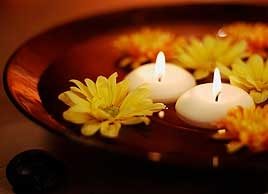Aromatherapy and essential oils: Benefits and uses
Aromatherapy can be soothing, uplifting, even healing’and it’s easily incorporated into your day. Learn about the benefits of aromatherapy and how to incorporate essential oils such as lavender, rosemary and peppermint into your beauty routine

Source: Best Health Magazine, October 2008
Aromatherapy’the use of essential oils derived from flowers and plants to heal and promote well-being’can be traced back thousands of years. It seems to have stood the test of time: Cosmetics companies are increasingly promoting aromatherapy’s benefits or expanding their lines to incorporate its principles. Aromatherapy is also the fastest-growing area of complementary medicine in the United States.
Among the purported benefits of aromatherapy: It boosts the immune system, relieves muscle pain, and treats and corrects insomnia. It has also been found to relieve stress. A 2007 study cited in the Journal of Clinical Nursing found that when emergency nurses were given 15-minute music-assisted aromatherapy massages over two 12-week periods, they experienced’not surprisingly!’significant improvements in their stress levels.
Here, some fragrant points about benefits, trends and how to apply essential oils.
- For a basic introduction to aromatherapy, consider these five essential oils for your health and well-being: lavender to relieve stress, help sleep problems, ease painful menstrual cramps and work as an antiseptic; grapefruit to help as a diuretic, lift your mood and help repair oily skin; peppermint to uplift and rejuvenate the body, reduce headaches and calm nausea; rosemary to stimulate hair growth, boost mental activity and reduce pain; and cedarwood to improve skin issues such as acne and psoriasis and to help alleviate congestion.
- Essential oils are typically inhaled or applied to the skin. Beware, though: You can’t apply all essential oils in their undiluted form to the skin. Most need to be added to carrier oils such as olive, grapeseed or sweet almond. Two essential oils that are less likely to cause irritation, side effects or possible allergic reactions on their own are tea tree oil (an antifungal, antiviral and antiseptic remedy) and lavender oil (which can be used on minor burns and skin irritations, and to reduce stress or anxiety).
- If you’re mixing your own, add two drops of undiluted essential oil to one to two ounces (30-60 mL) of carrier, says Paola Perin, spa director for The Spa at the Intercontinental Hotel in Toronto, who has studied and practises aromatherapy.
- Some companies, such as Crabtree & Evelyn, offer essential oils that are already blended with a carrier. Another easy option: The Body Shop’s aromatherapy-inspired Wellbeing line, which is divided into four ranges’Total Energy, Divine Calm, Deep Sleep and Gently Purify. All are designed to address different aspects of everyday stress, and include ingredients sourced through The Body Shop Community Trade program.
- Aromatherapy is going green as part of the ‘biodynamic’ farming movement. This focuses on the health of the soil by following earth cycles that affect seeding, growing and harvesting, thereby maximizing the living energy of plants as they grow. With biodynamic herbs and flowers, skin gets the purest possible care. Brands with biodynamic products include Jurlique, Dr. Hauschka, Florame, Primavera and Weleda.
- Need a midday pick-me-up? Try a spritz of rosewater on your face, says Perin. ‘It feels and smells amazing, it equalizes your skin’s pH balance and gives your face a really lovely dewy look.’ Perin’s choice: Jurlique Rosewater Balancing Mist.
This article was originally titled "Heaven Scent," in the October 2008 issue of Best Health Magazine. Subscribe today and never miss an issue!




